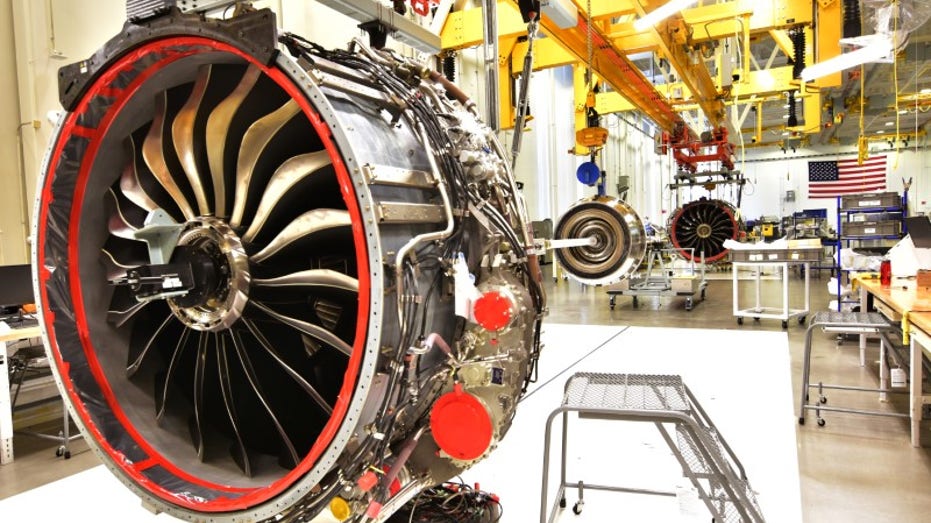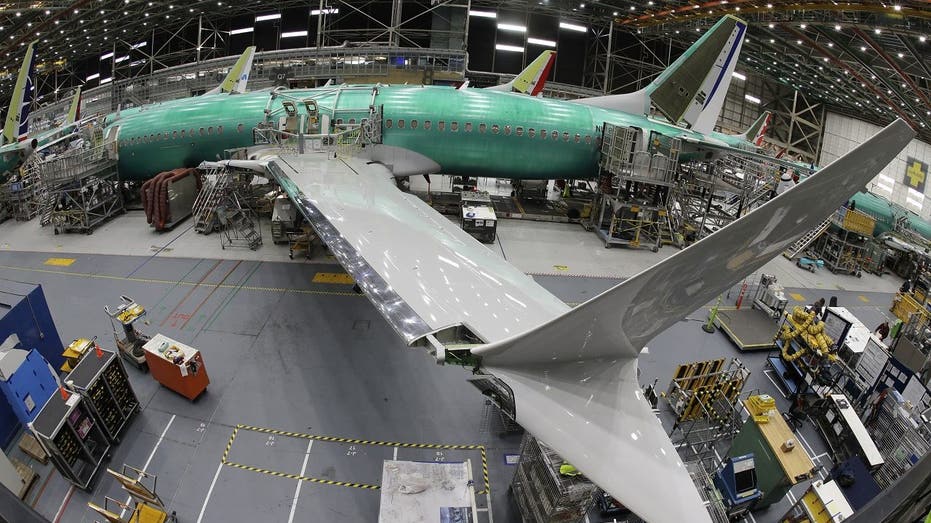GE's Boeing 737 MAX problem just got bigger
GE makes all of the MAX's engines through a joint venture with France's Safran SA
General Electric Co. will likely take a significant hit to its cash flow from Boeing Co.'s decision to halt production of the 737 MAX jetliner, which has already dented the conglomerate's finances.
GET FOX BUSINESS ON THE GO BY CLICKING HERE

Technicians build LEAP engines for jetliners at a new, highly automated General Electric (GE) factory in Lafayette, Indiana, U.S. on March 29, 2017. REUTERS/Alwyn Scott
GE makes all of the MAX's engines through a joint venture with France's Safran SA. When Boeing in April cut monthly production of the plane to 42 from 52, it reduced GE's quarterly cash flow by $400 million. The suspension of production Boeing announced Monday, if prolonged, could reduce cash flow by much more as analysts warn that GE won't receive payments made as the planes are being built.
GE's management has flagged the problems around the MAX in regulatory filings and public comments, but it also has said the impact is temporary and cash flow would rebound as production ramps up.
"It is going to create a significant cash drag for GE," said John Inch, an analyst at Gordon Haskett. He added, though, that "one engine program cannot make or break the fortunes of this company."
GE is expecting to get $21 billion in cash from selling biopharmaceutical assets and it intends to use proceeds to pay down debt weighing on its balance sheet. GE also has a safety net from $20 billion in credit lines syndicated through 36 banks that expire in 2021.
GE said it is working with customers and suppliers "to mitigate the impact of the temporary shutdown of the 737 MAX, while protecting the company's ability to accelerate production as needed in the future."
Southwest Airlines Co. earlier Tuesday said it was removing the 737 MAX from its flight schedule through April 13 as the airline sees uncertainty around the timing of the aircraft's return to service.
The final cost to GE is difficult to determine, according to analysts and people close to the company. GE makes other systems used on the MAX, and likely will negotiate with Boeing on the final outcome. There are also costs and other offsetting factors associated with its engine production.
"GE discloses insufficient financial information to be able to model any of this," Mr. Inch said.
Nick Heymann, a William Blair & Co. analyst, projected on Monday that the suspension could cut GE's quarterly cash flow by more than $2 billion. On Tuesday, he revised that estimate and said a slowdown in engine production during the MAX shutdown could help offset the pain because GE would be making fewer engines without getting paid. The amount of cash going to suppliers and tied up in inventory would drop, and thus reduce the ongoing hit to quarterly cash flow.
GE hasn't disclosed whether it will change its engine production during the MAX shutdown.
BOEING 737 MAX WOES TO TAKE BITE OUT OF US ECONOMY

FILE - In this March 27, 2019, file photo taken with a fish-eye lens, a Boeing 737 MAX 8 airplane sits on the assembly line during a brief media tour in Boeing's 737 assembly facility in Renton, Wash. Safety regulators want to fine Boeing nearly $4 m
Boeing's stated plan to focus on delivering the roughly 400 planes that are in storage, rather than making more planes, will benefit GE, said Jeff Sprague, analyst with Vertical Research, because the engine maker will get payments on those deliveries before production starts back up.
"The longer term question is whether the MAX suffers lasting reputational damage that shifts share to Airbus," Mr. Sprague said in a note to clients, referring to Boeing rival Airbus SE.
Aviation is GE's largest business by revenue and its health is vital to the conglomerate's overall turnaround. GE struggled in recent years after deep losses in its core power division and finance arm forced the company to slash its dividend and pursue plans to sell off major business units.
As production of the LEAP engine that powers the MAX increases, sales and margins in the divisions are projected to rise in coming years. The LEAP is an option for customers buying Airbus's A320neo airliner but it is the only engine used on the 737 MAX. GE also has military programs and other engines in production, meaning it may temporarily shift resources to other programs. Meanwhile, it has a lucrative business servicing the thousands of GE engines already in use around the world.
Melius Research recently projected the commercial engines business would bring in almost $26 billion in revenue next year, or 28% of GE's total revenue. The firm predicts GE Aviation's total revenue to approach $35 billion for 2020.
The extended grounding has already strained GE finances, cutting cash flow by as much as $1.4 billion this year as factories produce fewer engines and GE can't get fully paid for them. The LEAP engine is a major growth driver for the company's aviation unit, which accounted for $4.8 billion of GE's roughly $7 billion in industrial profits in the first nine months of 2019. GE has more than 17,000 orders for the engine.
CLICK HERE TO READ MORE ON FOX BUSINESS
(END) Dow Jones Newswires




















